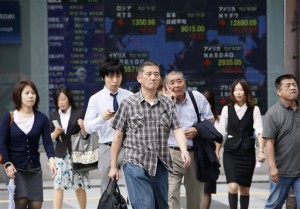
People cross a road in front of a digital display of global stock indeces at a securities firm in Tokyo Monday, July 2, 2012. Asian stock markets inched higher Monday amid continued optimism over Europe's moves to ease its debt crisis and economic malaise. (AP Photo/Koji Sasahara)
HONG KONG—Asian markets ended mixed Monday and the euro was down as a rally sparked by last week’s surprise eurozone deal fizzled out, with weak manufacturing data from China also weighing on investors.
Oil prices also fell as doubts crept in about the EU summit deal, which aimed to help crisis-hit Spain and Italy and stem the long-running eurozone debt crisis.
After rising in early trade, Tokyo edged down 0.04 percent, or 3.30 points, to close at 9,003.48, while Seoul closed down 0.13 percent, or 2.36 points, at 1,851.65.
Shanghai was flat, edging up 0.03 percent, or 0.68 points, to close at 2,226.11. But Sydney put on 0.94 percent, or 38.4 points, to close at 4,133. Hong Kong was closed for a public holiday.
“The European Summit concluded without agreement on the long-term details (fiscal union, etc.), but did offer relief for Spain and Italy with direct bank funding” from the eurozone bailout fund, the National Australia Bank said in a note.
It added the agreement was “positive, but there are questions about how long this takes to establish.”
European leaders agreed to use emergency funds to support ailing banks directly and to ease pressure on governments’ debt burdens through bond purchases. They also agreed on $150 billion in fresh funds to boost growth.
Weighing on markets Monday, two closely watched surveys showed weak manufacturing activity in China, renewing concerns about a slowdown in the world’s second-largest economy.
Official data released Sunday showed manufacturing activity fell to a seven-month low in June.
The official purchasing managers’ index (PMI) slipped to 50.2 last month from 50.4 in May, industry group the China Federation of Logistics and Purchasing said.
On Monday, the PMI from British bank HSBC, which focuses more on small- and medium-sized companies, showed manufacturing activity contracting for the eighth consecutive month in June.
The bank’s index fell to 48.2 in June from 48.4 in May, according to an HSBC statement. A PMI reading above 50 indicates expansion, while a reading below 50 points to contraction.
The data is “not horrible, but it isn’t showing a rebound,” Gigi Chan, manager of Threadneedle’s $100 million China Opportunities Fund in Singapore, told Dow Jones Newswires.
“Some people had hoped that some of the stimulus might have kicked in.”
China has taken measures, including an interest rate cut last month and trimming reserve requirements for banks, in a bid to boost its economy, which grew at its slowest pace in nearly three years in the first quarter of 2012.
Japan provided some good news, with a central bank survey showing improved sentiment among large manufacturers in the quarter ended June, although confidence remained low in the world’s third-biggest economy.
On Friday, world stock markets, the euro and oil all jumped after the EU summit in Brussels unexpectedly announced measures aimed at boosting the embattled single currency.
Asian markets posted gains of between 1 and 2 percent, and European markets rose even more sharply, with Milan rocketing 6.6 percent, and Madrid and Athens both surging 5.7 percent.
In the US the Dow jumped 2.2 percent and the Nasdaq 3 percent.
On currency markets in early European trade, the euro eased to $1.2623 and 100.41 yen from $1.2654 and 101.02 yen in New York late Friday. The dollar was quoted at 79.55 yen.
On oil markets, crude slipped on the weak data from China, the world’s biggest energy consumer, and profit-taking after Friday’s rises.
New York’s main contract, light sweet crude for August delivery, fell $1.18 to $83.78 a barrel in the afternoon and Brent North Sea crude for delivery in August shed $1.45 to $96.35.
Gold rose to $1,590.52 an ounce at 1100 GMT, compared with $1,579.62 an ounce late Friday.
On other markets:
— Taipei rose 0.67 percent, or 48.88 points, to 7,345.16.
Taiwan Semiconductor Manufacturing Co. gained 2.46 percent to Tw$83.3 while Fubon Financial Holding ended 1.85 percent higher at Tw$30.35.
— Wellington rose 1.19 percent, or 40.33 points, to 3,440.16.
Telecom Corp. gained 2.5 percent to NZ$2.45, Fletcher Building was up 3.2 percent at NZ$6.06 and Chorus was steady at NZ$3.14.
— Manila closed 1.03 percent, 53.83 points, higher at 5,300.24.
Ayala Land Inc. rose 2.08 percent to 22.05 pesos and Philippine Long Distance Telephone Co. added 2.40 percent to close at 2,716 pesos.
— Kuala Lumpur ended 0.11 percent, or 1.70 points, higher at 1,600.85.
Telekom Malaysia gained 0.35 percent to 5.67 ringgit, while UEM Land Holdings inched up 0.96 percent to 2.10. Financial firm CIMB Group Holdings lost 0.16 percent to 7.55 ringgit.
— Singapore was up 1.12 percent, or 32.14 points, at 2,910.59.
Keppel Corp. gained 3.31 percent to Sg$10.62 and DBS Group climbed 0.87 percent to Sg$13.99.
— Bangkok added 1.42 percent, or 16.63 points, to 1,188.74.
Banpu gained 4.02 percent to 466 baht, while PTT added 2.17 percent to 330 baht.
— Jakarta rose 0.91 percent, or 35.96 points, closing at 3,991.54.
Nickel and gold miner Antam rose 1.49 percent to 1,360 rupiah, carmaker Astra International gained 0.73 percent to 6,900 rupiah and cement manufacturer Indocement rose 4.61 percent to 18,150 rupiah.
— Mumbai fell 0.18 percent, or 31.0 points, to 17,398.98, snapping four straight days of gains.
India’s private steel producer Jindal Steel fell 2.49 percent to 457.8 rupees while leading vehicle maker Tata Motors slid 1.53 percent to 238.35 rupees after the company reported weaker-than-expected monthly sales.

